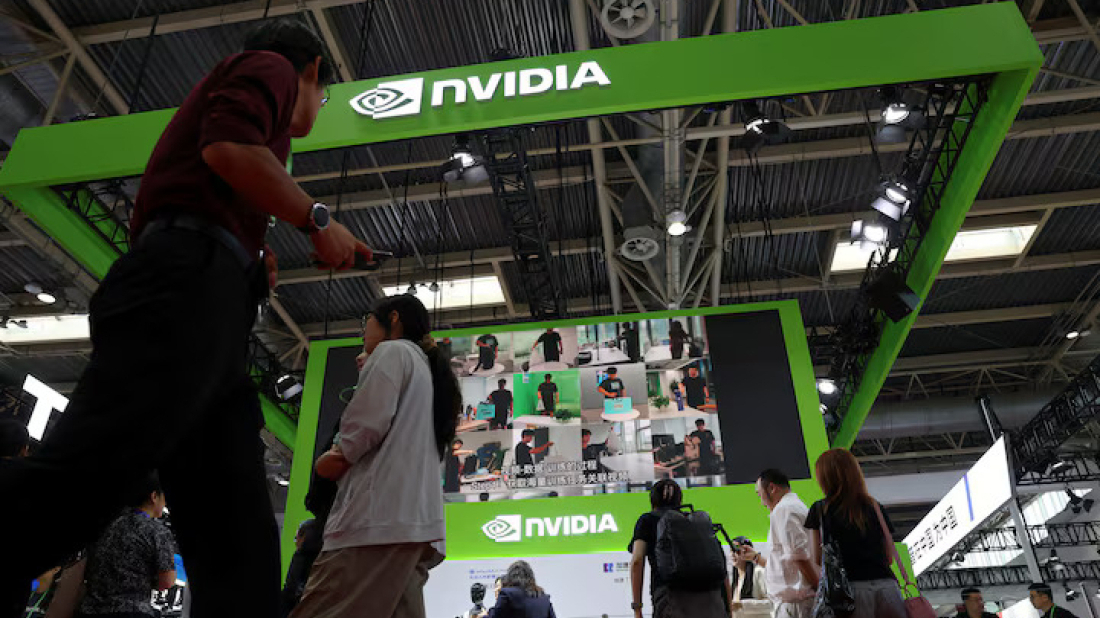Spain to probe X, Meta and TikTok over AI-generated child sexual abuse content
Spain’s government has instructed prosecutors to investigate social media platforms X, Meta and TikTok over the alleged creation and dissemination o...

Large investors, wary of September’s traditional seasonal downturns, moved to lock in profits on Tuesday, according to traders and research firms – a sign that the sell-off in technology shares may reflect a broader retreat from risk.
The tech-heavy Nasdaq (.IXIC) and the wider S&P 500 (.SPX) both fell sharply, led by declines in technology stocks that had surged for much of the year. Nvidia (NVDA.O) dropped 3.5 per cent, its steepest fall in nearly four months.
“This week’s tech sell-off looks less like panic and more like a general reshuffling of risk,” said Bruno Schneller, managing director at Erlen Capital Management. “We’ve seen crypto, high-beta tech and AI beneficiaries all come under pressure at the same time, which suggests investors are trimming exposure across multiple risk assets rather than reacting to a single headline.”
Two other hedge fund investors, speaking anonymously, said a momentum shift was under way, with funds and asset managers selling their winners. The pattern was also evident earlier on Wednesday in Korean tech shares and Chinese biotech-related equities, one investor noted. They warned this week’s moves could foreshadow trends in the weeks ahead.
September slowdown
Scott Rubner, head of equity and derivatives strategy at Citadel Securities, pointed out that since 1928, the S&P 500 index has often peaked on or around 3 September, before sliding in most years thereafter. September typically sees stock buying fade as retail demand slows and corporate buybacks pause in mid-month for regulatory reasons, Rubner said.
“After a summer of strong positioning and relentless upside, September historically brings a shift,” he added.
Citadel also noted that systematic traders such as hedge funds and trend-followers have already completed much of their buying, leaving little appetite to push equities higher. The final week of August usually sees low volumes due to holidays, which can create upward drift in stocks, Rubner said.
Meanwhile, larger asset managers will begin rebalancing portfolios ahead of the quarter’s close in September.
“Mostly, we’ve run out of catalysts to buy more. Valuations are high. What can you point to that would justify them going any higher?” asked Dan Izzo, founder of hedge fund BLKBRD.
Iran’s Supreme National Security Council Secretary Ali Larijani said the United States could evaluate its own interests separately from those of Israel in ongoing negotiations between Tehran and Washington.
U.S. Secretary of State Marco Rubio on Sunday (15 February) called it “troubling” a report by five European allies blaming Russia for killing late Kremlin critic Alexei Navalny using a toxin from poison dart frogs.
Cuba’s fuel crisis has turned into a waste crisis, with rubbish piling up on most street corners in Havana as many collection trucks lack enough petrol to operate.
Norway is holding a commanding lead in the medal standings with 12 golds and a total of 26, with Italy having an historic performance on home soil on the ninth day of the Milano-Cortina Winter Olympics on Sunday (15 February).
Iran’s Revolutionary Guards navy held military exercises in the Strait of Hormuz on Monday (16 February), state-linked media reported. The drill took place a day before renewed nuclear negotiations between Tehran and Washington in Geneva.
Millions of Colombian roses have arrived in the United States just in time for Valentine’s Day, keeping the country on track as the world’s second-largest flower exporter. Between 15 January and 9 February, Colombia shipped roughly 65,000 tons of fresh-cut blooms.
Russia’s car market is continuing to receive tens of thousands of foreign-brand vehicles via China despite sanctions imposed after Moscow’s full-scale invasion of Ukraine in 2022, a journalistic investigation has found.
Türkiye’s national energy company, TPAO, has struck a new cooperation deal with U.S. energy giant Chevron, signing a memorandum of understanding to explore joint oil and gas exploration and production opportunities, the Turkish Energy and Natural Resources Ministry announced on Thursday.
Wall Street ended sharply lower on Tuesday as investors worried about artificial intelligence (AI) creating more competition for software makers, keeping them on edge ahead of quarterly reports from Alphabet and Amazon later this week.
U.S. stock markets finished mixed on Wednesday (28 January) as investors reacted calmly after the Federal Reserve left interest rates unchanged, a decision that had been widely expected and largely priced in.
You can download the AnewZ application from Play Store and the App Store.

What is your opinion on this topic?
Leave the first comment